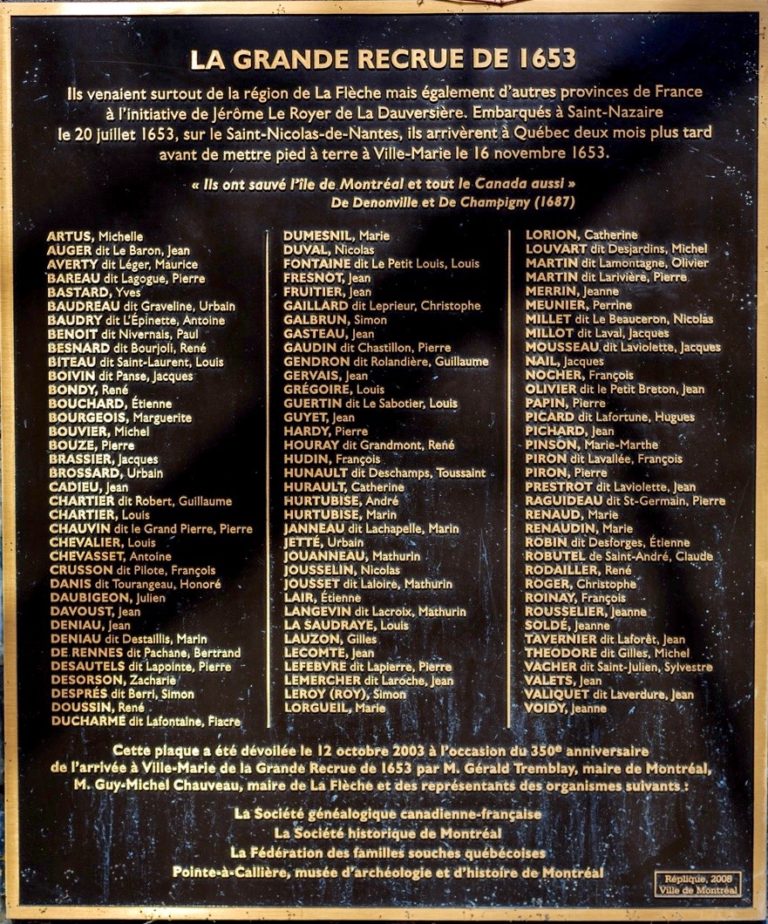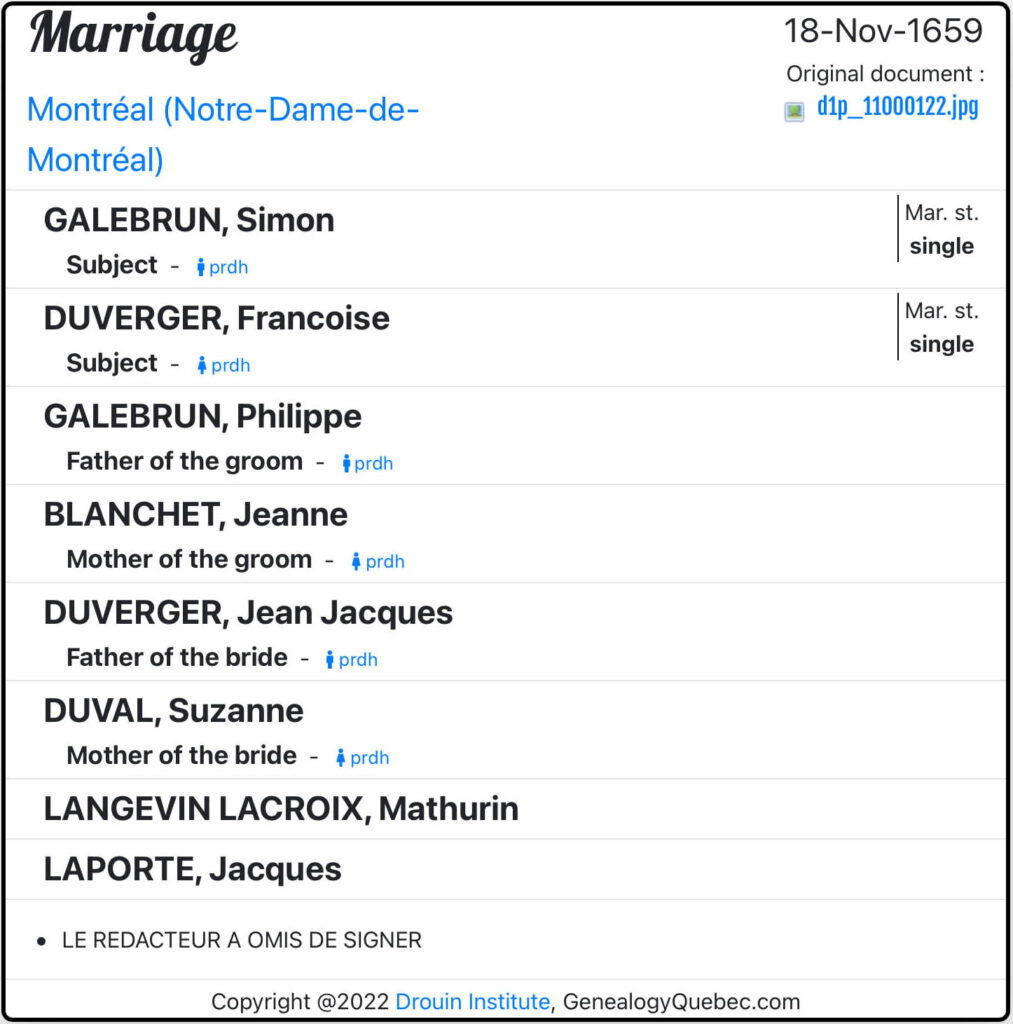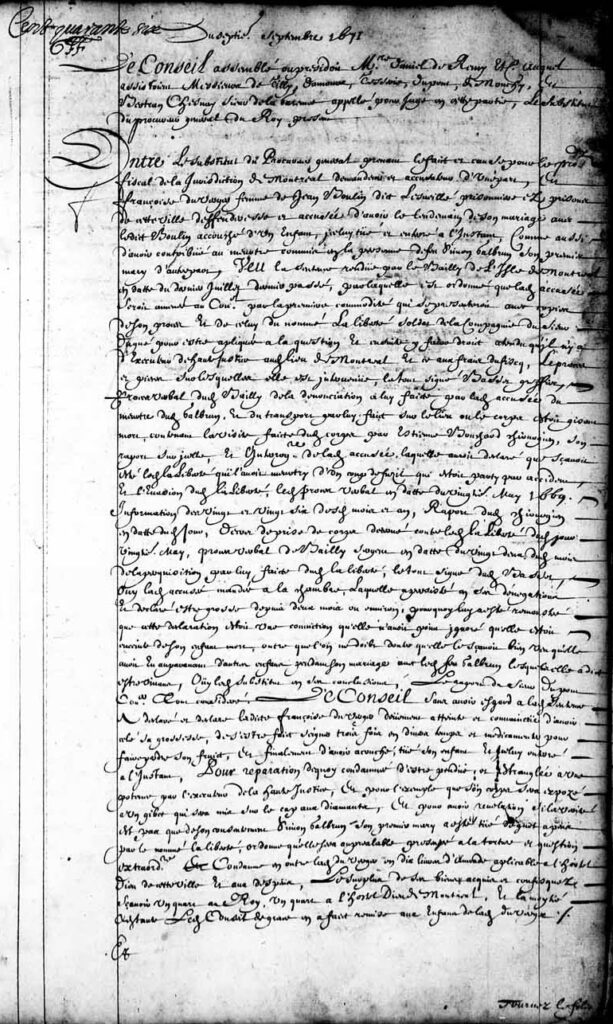Francoise Duverger and Simon Galbrun
Francoise Duverger and Simon Galbrun are my 9th great-grandparents on the Peltier side of the family. Francoise and Simon had both emigrated from France: Simon in 1653 and Francoise in 1659. Simon was a part of “LA GRANDE RECRUE” which was an effort to bring young, healthy men to New Canada in order to defend and establish the colony and Francoise was a “Fille a Marier,” one of the founding mothers of Canada.

Simon Galbrun is listed in the center column 7th from the top.
Translation:
The Great Recruit of 1653
They came mainly from the region of La Fleche but also from other provinces of France at the initiative of Jerome Le Royer de la Dauversiere. Embarked at Saint-Nazaire on July 20, 1653, on the Saint-Nicolas-de-Nantes, they arrived in Quebec City two months later before setting foot on the ground at Ville-Marie [Montreal] on November 16, 1653.
“They saved the island of Montreal and all of Canada too”
From Denonville and De Champigny (1687)
End of translation.
Simon and Francoise signed a marriage contract on November 3, 1659 and were married at Notre-Dame de Montreal on November 18, 1659.

Over the next 8 years, Francoise gave birth to 4 children: Jacques Simon, Marie, Jean Baptiste (who lived for less than a month) and my 8th great-grandmother Catherine.

On May 20, 1669 Simon was “found dead in the commune” of Montreal. The surgeon Etienne Bouchard arrived on the scene and determined that the victim had died from a fatal gunshot wound. Simon’s wife Francoise claimed that a man named Laliberte, who had since disappeared, “had bruised him with a shotgun blast that had gone off by accident.”3 The matter was not pursued any further and Simon was buried that same day. At the time of his death he was about 34 years old.
About 2 years later on June 29, 1671 in Montreal, Francoise remarried to Jean Boulin dit l’Eveille, a Carignan soldier who had been in New France since August 18, 1665.4
On September 7, 1671, just over 2 months after her marriage, Francoise is in prison in Montreal. The accusations are horrendous. The transcript from the deliberation of the Sovereign Council (the court) is shown below, along with a translation.5 I’ve highlighted and underlined some of the pertinent parts in the translation.

Translation of the transcript:
“From the seventh of September, 1671. The assembled Council presided over by Sir Daniel de Remy etc., attended by Messrs. de Tilly, Damours, Tesserie, Dupont, deMouchy, and Bertrand Chesnay, Sieur de LaGarenne called as judge in this part , the Deputy Public Prosecutor of the King present. Between the deputy of the attorney general taking the fact and cause for the tax attorney of the jurisdiction of Montreal, plaintiff and accuser on the one hand, and Francoise DUVERGER wife of Jean Boutin dit Leveille, prisoner of the prisons of this defendant city and accused of having the day after her marriage to the said Boutin, given birth to a child, killed and buried him instantly, as also having contributed to the murder committed in the person of the late Simon Galbrun her first husband on the other hand, seen the sentence rendered by the bailiff of the island of Montreal dated the last July, by which it is ordered that the said accused be brought to the Council by the first convenience which would appear with copies of her trial and that of the named Laliberte, soldier of the company of Mr. Dugue to be applied to the question and then to make right there given that there is no executor of high justice at the said place of Montreal and this at the expense of the tax authorities; the trial and documents on which it intervened, all signed Basset clerk minutes of the said bailiff of the denunciation made to him by the said accused of the murder of the said Galbrun, and of the transport by him to the place where the body was lying dead, containing the visit made to the said body by Etienne Bouchard, surgeon, his report on it and the interrogation of the said accused, who would have declared that it had been the said LaLiberte who had bruised him with a gunshot which had gone off by accident, and the escape of the said LaLiberte, the said report dated the twentieth of May, 1669. Information of the twenty and twenty-sixth of the said months and year; report of said surgeon dated said day; writ of arrest issued against the said Laliberte on the said twentieth day of May;Minutes of Sergeant Bailly, dated the twenty-second of the said month, of the search made by him of the said Laliberte, all signed by the said Basset; heard the said accused summoned to the chamber, who persisted in her denials and declared to have been pregnant for two months or so, why was she reminded that this declaration was a condition that she had not been unaware of that she was pregnant with her dead child, apart from the fact that there can be no doubt that she knew it well, seeing that she had previously had other children during her marriage to the said late Galbrun, whom she said were alive; heard the said attorney in his submissions; the report of Mr. Dupont adviser all considered. The Council, without having , a regard to the said sentence, declared and declares the said Francoise Duverger duly affected and convicted of having concealed her pregnancy, of having been treated three times at various times and medicated to make her lose her fruit, and finally of having gave birth, killed her child and buried him at once, for reparation of which sentenced to be hanged and strangled on a gallows by the executor of high justice, and for the example that her body will be exposed to a gallows which will be put on the Cap aux Diamants, and to have revelation if the truth is not that with her consent Simon Galbrun her first husband was ambushed by the named Laliberte, orders that she will first be presented to torture and extraordinary question; further condemns the said Duverger to a fine of ten pounds applicable to the Hotel-Dieu of this city and to the costs, the surplus of his property acquired and confiscated, namely a quarter to the King, a quarter to the Hotel-Dieu of Montreal , and the remaining half of the said Council of Grace, gave it to the children of the said Duverger. And it is retained that the execution will be suspended until the end of next October, that it will be visited to know if it is large, in which case it will be suspended until it is delivered, and will be enjoined to the jailer not to allow her to communicate with the said Boutin, her husband. There is a supplementary testament in the bundle. COURCELLE Pronounced and executed in the person of the said Duverger by the executor of the high justice, following the judgment of this day in Quebec on the seventeenth of November one thousand six hundred and seventy-one. PEUVRET.”
End of translation.
In short, Francoise was accused and convicted of having concealed her pregnancy and killing her child (infanticide) and “of having been treated three times at various times and medicated to make her lose her fruit” (abortion). At the time of the hearing Francoise claimed she was 2 months pregnant so they decided that until it could be determined if she was pregnant or not, the order of execution would be on hold. In the meantime, since Laliberte had disappeared, she would be submitted to torture and extraordinary question to try to determine if she had conspired with Laliberte to kill her husband. Whether or not she admitted to conspiring with Laliberte, she was a condemned woman and it was only a matter of time before she would be “hanged and strangled on a gallows.”
On November 12, 1671 surgeon Roussel and lady Morin, a midwife, visited Francoise and found that she was not fat (pregnant). Francoise was hung and strangled on the gallows five days later on November 17, 1671.6 She was about 35 years old. Her children, 10 year old Jacques Simon, 8 year old Marie and 4 year old Catherine (my 8th great-grandmother) became orphans.
As can be seen from Francoise’s story, judgment in New France was carried out quickly and punishment for conviction was harsh. Due to the poor state of detention facilities, trials were often conducted with great haste to avoid prisoners escaping. In similar fashion, there was a risk of having charges dropped so interrogations under oath with the accused were conducted within 24 hours.
If torture and extraordinary punishment was decided upon, the accused was brought to the court and tortured under the supervision (theoretically) of a doctor and two surgeons.7 The conventional torture method in New France made use of “torture boots” which were wooden planks fastened between the knee and ankle. The torturer would then drive wooden wedges between the planks and the shin, which tightened the planks and significantly increased the level of pain.
Overall crime rates in New France were low, given that many crimes were severely punished,. One study, by historian Eric Wenzel, looked at the records of 396 trials from courts in Montreal and Quebec between 1670 and 1760. In them he found that the majority of crimes that took place were related to property and sales. Nearly a quarter (96 out of 396) of documented crimes were theft with another 90 cases accounting for the illegal sale of alcohol to natives, as well as 49 cases of illegal sale to the English colonies. This is in contrast to a relatively low number of violent crimes such as murder (23 counts), assault (24 counts), rape (3 accounts), duels (8 counts), and infanticide (5 counts). Other crimes listed included, arson, vagabondage, suicide, desertion, fraud, sacrilege, and disturbing the peace.8
With such a low number of violent crimes occurring over the 90 year period the study looked at, I would tend to think that the punishment for a violent offense was a very strong deterrent.
I cannot stand in judgment of Francoise. I don’t know who she was or what she thought, nor do I know whether or not she did commit the crimes she was accused of, and if she did, why she did so. I’ve read a number of articles about the accusations made against Francoise and one current opinion, written by a lawyer, said that they believed there was insufficient evidence to convict her of any crime. We will never know the truth about what happened. Mostly I wonder about the children she left behind; they were so young and innocent.
Thanks for visiting, come back soon,
Cindy
© 2023 Copyright by Cynthia Vadnais, All Rights Reserved
Francoise Duverger and Simon Galbrun Read More »
